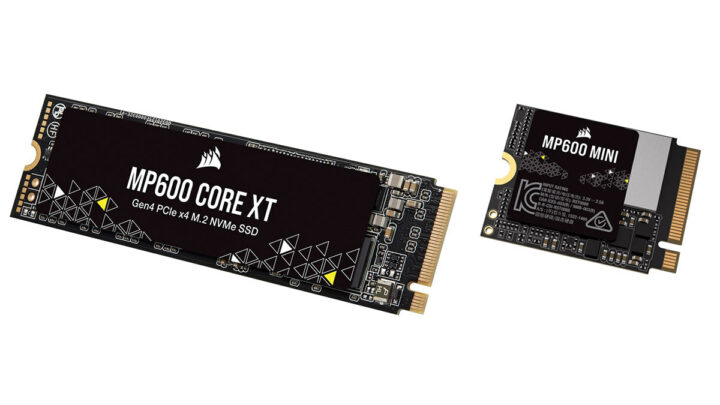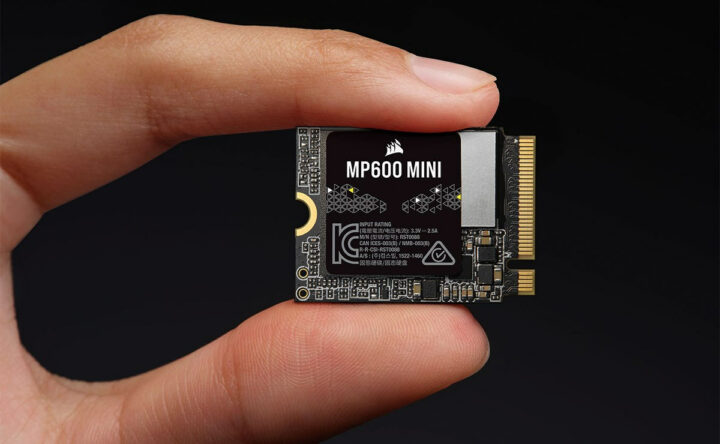Corsair MP600 Mini is a high-performance M.2 2230 SSD based on the Phison E21T controller that delivers up to 4800MB/s sequential read and write performance and designed to be used in Valve’s Steam Deck, Microsoft’s Surface Pro 8 and 9, and other products that won’t take a M.2 2280 SSD.
We are seeing more and more single board computers and other electronics products use M.2 sockets for storage, but the smaller boards won’t take the traditional M.2 2280 SSDs that usually deliver better performance than smaller M.2 2230/2242/2260 drives, and so performance may be impacted on this type of hardware. But the Corsair MP600 Mini changes that with high sequential and random read/write performance.
Corsair MP600 Mini specifications:
- SSD Unformatted Capacity – 1TB
- NAND Technology – 3D TLC NAND
- Host interface – PCIe Gen 4.0 x4
- Performance
- Max Sequential Read – Up to 4,800MB/s tested with CrystalDiskMark (CDM)
Max Sequential Write – Up to 4,800MB/s (CDM) - Max Random Write – Up to 1.1M IOPS (QD32 IOMeter)
- Max Random Read – Up to 850K IOPS (QD32 IOMeter)
- Max Sequential Read – Up to 4,800MB/s tested with CrystalDiskMark (CDM)
- Misc – SSD Smart support, AES 256-bit encryption
- Supply Voltage – 3.3V, +/- 5%
- Power Consumption
- 4.3W on average while active
- DEVSLP – PS4: <5mW
- Dimensions – M.2 2230 form factor
- Weight – 28 grams
- Temperature Range – Operating: 0°C to +70°C; storage: -40°C to +85°C
- Humidity – Operating: 90% RH (40°C); storage: 93% RH (40° C)
- Endurance – 600 TBW
- MTBF – 1,500,000 hours
- SSD Shock – 1500 G
- Vibration – 20Hz~80Hz/1.52mm, 80Hz~2000Hz/20G

M.2 2230 SSDs were rather niche storage products in the recent past with few players involved, but with the launch of devices like the Steam Deck, there’s now more demand, which must explain why Corsair entered the market. Note that many devices with an M.2 2230 socket won’t expose a PCIe Gen 4.0 x4 interface, including the Steam Deck limited to PCIe 3.0 x4, so they won’t reach 4800 MB/s, but the M600 Mini should still deliver good performance, especially in terms of random I/Os, compared to many competitors.
Corsair is selling the MP600 Mini SSD for $109.99 on its online store. Tom’s Hardware notes existing competitors for the tiny 1TB Corsair SSD include the INLAND TN436 for $119 and SABRENT Rocket SB-2130-1TB for $159, and low capacity models (512GB) start at $72.99, but the performance of either model does not quite match the one of the MP600 Mini SSD.
Via Anandtech

Jean-Luc started CNX Software in 2010 as a part-time endeavor, before quitting his job as a software engineering manager, and starting to write daily news, and reviews full time later in 2011.
Support CNX Software! Donate via cryptocurrencies, become a Patron on Patreon, or purchase goods on Amazon or Aliexpress






> Tom’s Hardware notes existing competitors for the tiny 1TB Corsair SSD
There’s also some 2230 from WD, Kioxia and Transcend…
Good catch, Jean-Luc.
Thanks to David for the tip 🙂
*laugh* I meant it was good that you saw my comment on that older thread and thought it worth making a post of, but thank you. Because it didn’t occur to me that it was newsworthy, it took your perspective to realize that.
I always read ALL comments on my website. OK, maybe I skip over some of the longer ones… 🙂
OY! Thomas, he’s talking about you!
Pfew at least it’s not me 🙂
Thanks for info.
Are there any benchmark that would let us compare the performance of SSD shipped with surface pro 9 compared to this one ? (in my case it’s a 256GB)
Windows? https://crystalmark.info/en/software/crystaldiskmark/
raw results here ; 3428.883 MB/s for sequential read on my MZ9L4256HCJQ-00BMV-SAMSUNG
------------------------------------------------------------------------------CrystalDiskMark 8.0.4 x64 (C) 2007-2021 hiyohiyo
Crystal Dew World: https://crystalmark.info/
------------------------------------------------------------------------------
* MB/s = 1,000,000 bytes/s [SATA/600 = 600,000,000 bytes/s]
* KB = 1000 bytes, KiB = 1024 bytes
[Read]
SEQ 1MiB (Q= 8, T= 1): 3428.883 MB/s [ 3270.0 IOPS] < 2444.01 us>
SEQ 128KiB (Q= 32, T= 1): 3465.522 MB/s [ 26439.8 IOPS] < 1209.55 us>
RND 4KiB (Q= 32, T=16): 1890.157 MB/s [ 461464.1 IOPS] < 1107.56 us>
RND 4KiB (Q= 1, T= 1): 80.622 MB/s [ 19683.1 IOPS] < 50.64 us>
[Write]
SEQ 1MiB (Q= 8, T= 1): 2495.719 MB/s [ 2380.1 IOPS] < 3355.59 us>
SEQ 128KiB (Q= 32, T= 1): 2455.791 MB/s [ 18736.2 IOPS] < 1705.64 us>
RND 4KiB (Q= 32, T=16): 1696.226 MB/s [ 414117.7 IOPS] < 1234.23 us>
RND 4KiB (Q= 1, T= 1): 220.880 MB/s [ 53925.8 IOPS] < 18.44 us>
Profile: Default
Test: 1 GiB (x5) [C: 55% (69/127GiB)]
Mode: [Admin]
Time: Measure 5 sec / Interval 5 sec
Date: 2023/04/28 18:56:53
OS: Windows 11 Professional [10.0 Build 22621] (x64)
Thanks for the heads up Jean-Luc.
Little fyi: You’ve accidently written Cordair instead of Corsair above the tech specs. For a moment I thought it may have been an AliExpress competitor.
One more tiny M.2 2230 SSD: Cervoz T425 M.2 2230 (A+E key) NVMe PCIe Gen3x2 SSD
https://www.cervoz.com/company/news/m2-2230-pcie-gen3x2-ssd/detail